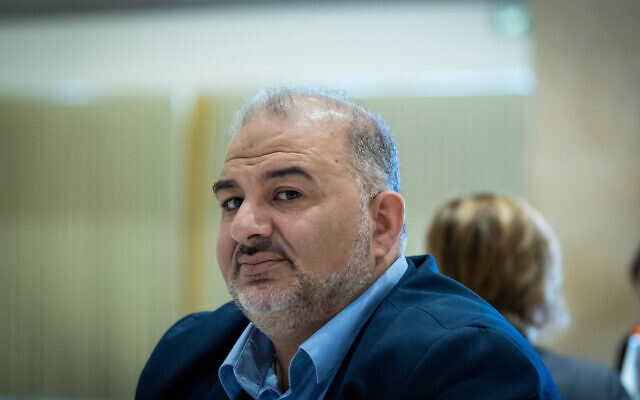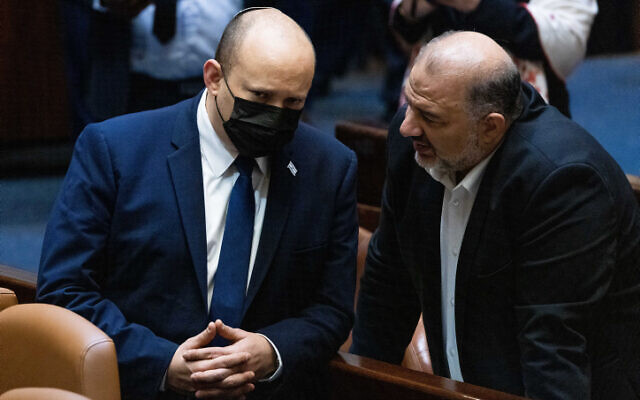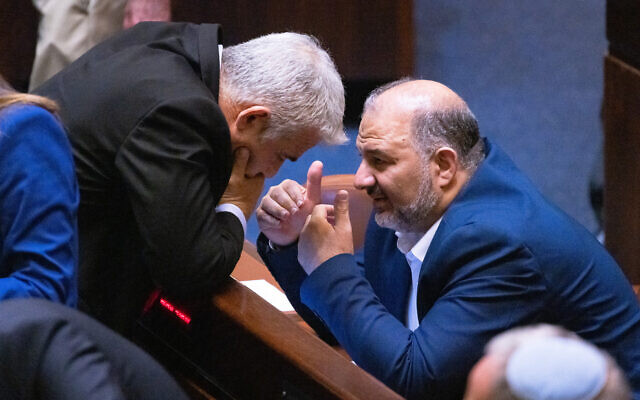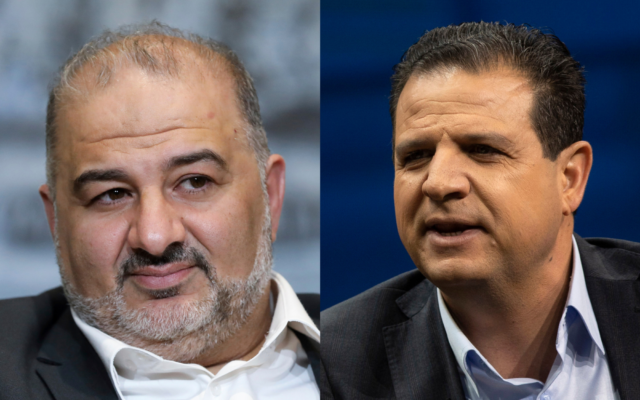Report claims Islamist party won’t quit coalition but plans to keep freeze in place; Ra’am reportedly considering reuniting with Joint List

The religious council behind the Ra’am party held deliberations for hours Tuesday evening on the Arab party’s continued membership in the coalition.
The party froze its participation in government last month amid mass unrest at the Al-Aqsa Mosque on Jerusalem’s Temple Mount.
The meeting of the Shura Council of the Islamic Movement’s Southern Branch took place in Kafr Qasim in northern Israel.
It came ahead of a vote slated for Wednesday on a Likud-led bill to dissolve the Knesset. The vote is only a preliminary one and the bill would need to clear three more plenum readings if it is to be approved. But Ra’am’s abstention would likely lead to the bill passing the initial hurdle, and some commentators believe this would put the coalition on a one-way trajectory toward dissolution.
“We’ll put everything on the table,” Ra’am chief Mansour Abbas told reporters before the meeting. “We will discuss our options and make a decision as any democratic party that respects itself would.”
He added that the guiding principle of the party will be the interests of the Arab community in Israel, rather than a personal or partisan consideration.
According to a report by Channel 12 on Tuesday evening, the leading option for Ra’am would be to remain in the coalition, while retaining its frozen status — meaning it will not attend Wednesday’s vote.
According to the report, Abbas has voiced concerns about Ra’am quitting the coalition, despite believing it is nearing its end, because he does not want to be identified as the person responsible for toppling the government.

The report also said that another decision expected to come out of the meetings is that members of Ra’am will largely cut off communications with Prime Minister Naftali Bennett and communicate mostly through Alternate Prime Minister and Foreign Minister Yair Lapid, due to frustration with the premier’s statements on Israel’s policies in Jerusalem.
The report also said the Islamist party will make stronger demands in regard to policies at the Al-Aqsa Mosque compound atop the Temple Mount, and in the Negev, in order to be seen as serving the interests of the Arab community. Negotiations will be led by hawkish Ra’am MK Walid Taha, rather than by Abbas, the report added.
Coalition sources speaking to Channel 12 voiced serious concerns about Ra’am’s conduct, noting that unlike previous crises with the party, this one was characterized by a complete lack of communication.
Acting coalition chairman Boaz Toporovsky said earlier Tuesday that the situation posed a “real threat” to the coalition.
“The disagreements with Ra’am are not about the Temple Mount, but about them not seeing sufficient results in regard to Israel’s Arab citizens,” he told Army Radio.

Meanwhile, Channel 12 news said in an unsourced report on Tuesday that senior officials in Ra’am have held talks with the majority-Arab Joint List on possibly reuniting in the event of new elections. Ra’am was previously part of the Joint List, which is made up of several factions, but it ran alone in the March 2021 elections and won four seats while the Joint List won six.
A Channel 13 poll Monday showed Ra’am falling below the threshold if elections were held today and failing to win any seats, while the Joint List would win eight.
But Abbas on Tuesday attacked his erstwhile partners in the Joint List, saying they had failed to serve the Arab sector. In a Facebook post, Abbas called the Joint List’s actions in parliament “a stab in the back of the Arab community and Ra’am.” The two parties have regularly attacked each other over their different approaches to participation in politics.
Asked by Channel 13 if he was in talks with Bennett, Abbas said, “I’m always talking to Bennett,” adding: “Ra’am has the confidence that it is doing the right thing for the Arab sector above all else and for advancing the topics it represents. We are aware that the coalition has parties with many different considerations. What we care about is us.”

As reported by The Times of Israel
